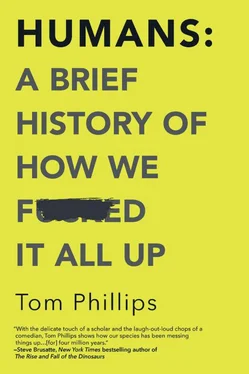Tom Phillips - Humans - A Brief History of How We F*cked It All Up
Здесь есть возможность читать онлайн «Tom Phillips - Humans - A Brief History of How We F*cked It All Up» весь текст электронной книги совершенно бесплатно (целиком полную версию без сокращений). В некоторых случаях можно слушать аудио, скачать через торрент в формате fb2 и присутствует краткое содержание. Город: Toronto, Год выпуска: 2019, ISBN: 2019, Издательство: Hanover Square Press, Жанр: История, Юмористические книги, на английском языке. Описание произведения, (предисловие) а так же отзывы посетителей доступны на портале библиотеки ЛибКат.
- Название:Humans: A Brief History of How We F*cked It All Up
- Автор:
- Издательство:Hanover Square Press
- Жанр:
- Год:2019
- Город:Toronto
- ISBN:978-1-48805-113-5
- Рейтинг книги:4 / 5. Голосов: 1
-
Избранное:Добавить в избранное
- Отзывы:
-
Ваша оценка:
- 80
- 1
- 2
- 3
- 4
- 5
Humans: A Brief History of How We F*cked It All Up: краткое содержание, описание и аннотация
Предлагаем к чтению аннотацию, описание, краткое содержание или предисловие (зависит от того, что написал сам автор книги «Humans: A Brief History of How We F*cked It All Up»). Если вы не нашли необходимую информацию о книге — напишите в комментариях, мы постараемся отыскать её.
Humans: A Brief History of How We F*cked It All Up — читать онлайн бесплатно полную книгу (весь текст) целиком
Ниже представлен текст книги, разбитый по страницам. Система сохранения места последней прочитанной страницы, позволяет с удобством читать онлайн бесплатно книгу «Humans: A Brief History of How We F*cked It All Up», без необходимости каждый раз заново искать на чём Вы остановились. Поставьте закладку, и сможете в любой момент перейти на страницу, на которой закончили чтение.
Интервал:
Закладка:

The manner of his death is grimly ironic enough—but that’s not the reason Tom Midgley is in this book. He’s in this book because, incredibly, being killed in bed by his own invention doesn’t even make it into the top two biggest mistakes of his life.
In fact, by pretty much any standard, he has to rank as one of the most catastrophic individuals who ever lived.
Midgley was a quiet, clever man who spent most of his life in Columbus, Ohio. From a family of inventors, he had barely any training as a chemist, but showed a knack for problem-solving across a range of disciplines—through a combination of systematic examination of the issues on one hand, and on the other a tendency to haphazardly but doggedly throw solutions at a problem until something stuck.
In the 1910s and 1920s, he was working on the problem of car engines “knocking”—a persistent problem where engines would stutter and jerk, especially when put under strain. This didn’t just make early automobiles kind of suck, it also reduced fuel efficiency, a major concern at a time when there were early worries that the world’s oil supplies were due to run low sooner rather than later.
Midgley and his boss, Charles Kettering, suspected that knocking was down to the fuel used burning unevenly, rather than a fundamental flaw in the design of engines. So they set about trying to find an additive that would reduce this effect. Initially, for reasons that make astonishingly little sense, they settled on the idea that the solution was “the color red.” Midgley went out to get some red dye, but the lab didn’t have any. He was told, however, that iodine was kind of reddish and dissolved well in oil, so he basically went, “Ah, what the heck,” stuck a load of iodine in some gasoline and whacked it into an engine.
It worked.
It was complete dumb luck, but they’d hit on proof that they were on the right track. Iodine itself wasn’t a workable solution: it was too expensive and too difficult to produce in the quantities they’d need. But it was enough to convince them to carry on their work. Over the following years, they tried—depending on which corporate statement you believe—somewhere between 144 and 33,000 different compounds. If that seems like quite an imprecise range, well, there’s a reason why the companies behind their work have been kinda vague about the research process.
The reason is that the substance they finally settled on was lead (specifically, a liquid compound called tetraethyl lead, or TEL). And lead is a deadly poison. It causes, among other things, high blood pressure, kidney problems, fetal abnormalities and brain damage. It particularly affects children.
Midgley’s story is often told as an example of “unintended consequences,” which… No, not really. Granted, “poisoning entire generations of people all across the globe” wasn’t actually his goal. But equally, nobody involved in the production and popularization of leaded gasoline gets to play the “oh no, what a horrible and unforeseen surprise” card.
Lead’s toxic nature wasn’t a new discovery—it’s been known for literally thousands of years. Before the first gas pump had even started supplying the new antiknock fuel in early 1923, medical experts were warning that this was a terrible, terrible idea. William Clark of the US Public Health Service wrote in a letter that using tetraethyl lead presented a “serious menace to public health” and predicted—entirely accurately—that “on busy thoroughfares it is highly probable that the lead oxide dust will remain in the lower stratum.”
In an even more upsettingly accurate prediction in 1924, a leading toxicologist foresaw that “the development of lead poisoning will come on so insidiously that leaded gasoline will be in nearly universal use… before the public and the government awaken to the situation.”
And the thing is, it’s not like lead was the only available solution. In the years since their iodine breakthrough, Midgley’s team had come up with loads of effective antiknock agents. One of which was impressive in its simplicity: ethanol. A viable fuel in its own right, your basic drinkin’ alcohol isn’t just good for sterilizing physical wounds and temporarily cleansing emotional wounds, it also works well as an antiknock additive—with the added benefit that it’s incredibly easy and cheap to produce on a mass scale.
In fact, for years, Midgley’s team had been backing ethanol as the perfect solution to the engine-knocking problem. So why did they drop that in favor of a substance that everybody knew was toxic as hell? You will be shocked to learn that the reason was money.
The trouble was that ethanol was simply too easy and cheap to produce. And, crucially, it wasn’t patentable. Charles Kettering’s company, Delco, had been bought up by the giant General Motors in 1918, and there was pressure on his research team to show that they could generate actual cash, rather than just a bunch of pie-in-the-sky tinkering. Ethanol—a substance so easy to make that people could do it at home, with no hope of it being turned into a proprietary product—was useless for that purpose. And so they went with lead.
In case you think poor Thomas Midgley was simply a harmless inventor whose work was misused by some nasty plutocrats: nah. In fact, he was the one who suggested and strongly advocated using lead. He even did the math, calculating that they could charge an extra three cents on the gallon on TEL fuel, and predicting they could capture 20 percent of the gasoline market with an aggressive ad campaign. On that, like a lot of things, he was wrong by virtue of wildly underestimating his work’s impact: in just over a decade, tetraethyl lead gasoline—under the brand name Ethyl, cunningly not mentioning the “lead” bit—had actually captured 80 percent of the US market.
All the way, General Motors and Midgley insisted it was safe, despite plenty of what you might call “warning signs.” Huge flashing neon warning signs. Like the fact that in February 1923, when Ethyl first went on sale, Midgley himself had to take the whole month off work due to ill health caused by the lead fumes. Or like the fact that workers at the factories that made the fuel kept on dying a lot. Five workers died from lead poisoning at the Bayway plant in New Jersey, and 35 were hospitalized, many of them driven insane by the neurological effects of lead—“the patient becomes violently maniacal, shouting, leaping from the bed, smashing furniture and acting as if in delirium tremens,” one report recorded. Six workers died at the New Jersey Deepwater plant, where hallucinations caused by the lead were so common that workers renamed it the “House of Butterflies.” The deaths made it to the front page of the New York Times . Faced with a public relations crisis, sale of Ethyl was suspended, and the US Surgeon General hastily set up a committee to determine its safety.
And then, in a remarkable bit of corporate judo that would come to serve as the template for a whole range of fucking-stuff-up industries over the rest of the twentieth century, the companies behind the Ethyl Gasoline Corporation—General Motors, Standard Oil and chemical behemoth DuPont—managed to turn that PR crisis into a PR win.
It was a classic example of responsible people answering entirely the wrong question. The focus of public concern on the deaths at the manufacturing stage was so strong that, in the end, that was the only issue the Surgeon General’s committee actually delivered a verdict on. Persuaded by the firms’ assurances that extra safety measures would be taken in their factories—TEL, Midgley said in his testimony, was “not so much a dangerous poison as it is a treacherous one”—the committee decided not to ban its manufacture. The much bigger question of its effect on the exhaust-fume-breathing public was never actually decided: that was, in the time-honored tradition, a matter for future research. But the committee’s decision was spun to the public and the politicians as giving leaded gasoline an entirely clean bill of health.
Читать дальшеИнтервал:
Закладка:
Похожие книги на «Humans: A Brief History of How We F*cked It All Up»
Представляем Вашему вниманию похожие книги на «Humans: A Brief History of How We F*cked It All Up» списком для выбора. Мы отобрали схожую по названию и смыслу литературу в надежде предоставить читателям больше вариантов отыскать новые, интересные, ещё непрочитанные произведения.
Обсуждение, отзывы о книге «Humans: A Brief History of How We F*cked It All Up» и просто собственные мнения читателей. Оставьте ваши комментарии, напишите, что Вы думаете о произведении, его смысле или главных героях. Укажите что конкретно понравилось, а что нет, и почему Вы так считаете.












